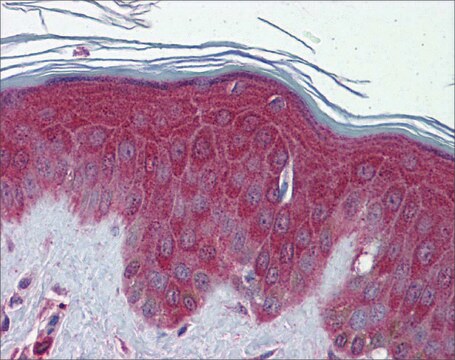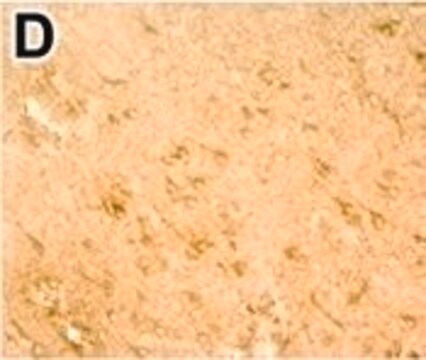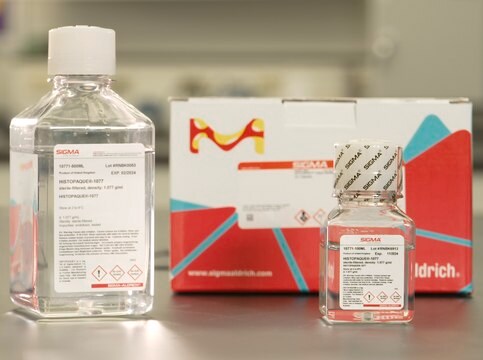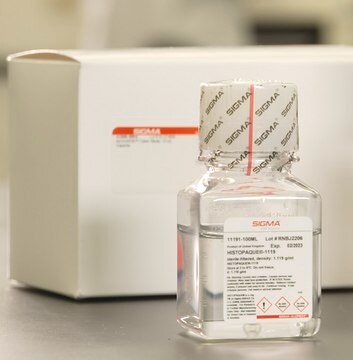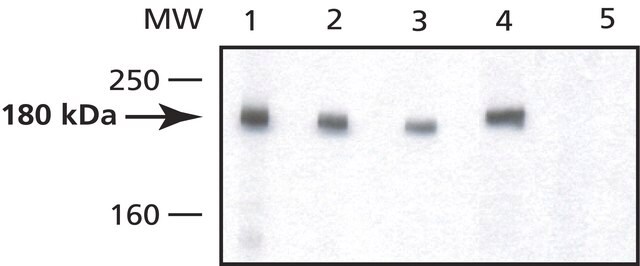ABS1036
Anti-FMO3 Antibody
serum, from rabbit
동의어(들):
Dimethylaniline monooxygenase [N-oxide-forming] 3, Dimethylaniline oxidase 3, FMO form 2, FMO 3, FMO II, Hepatic flavin-containing monooxygenase 3, Trimethylamine monooxygenase
로그인조직 및 계약 가격 보기
모든 사진(2)
About This Item
UNSPSC 코드:
12352203
eCl@ss:
32160702
NACRES:
NA.41
추천 제품
생물학적 소스
rabbit
Quality Level
항체 형태
serum
항체 생산 유형
primary antibodies
클론
polyclonal
종 반응성
human
종 반응성(상동성에 의해 예측)
chimpanzee (based on 100% sequence homology)
기술
immunohistochemistry: suitable
western blot: suitable
NCBI 수납 번호
UniProt 수납 번호
배송 상태
dry ice
타겟 번역 후 변형
unmodified
유전자 정보
human ... FMO3(2328)
일반 설명
Dimethylaniline monooxygenase [N-oxide-forming] 3 (EC 1.14.13.8; EC 1.14.13.148; UniProt P31513; also known as Dimethylaniline oxidase 3, FMO form 2, FMO 3, FMO II, Hepatic flavin-containing monooxygenase 3, Trimethylamine monooxygenase) is encoded by the FMO3 (also known as FMOII, TMAU) gene (Gene ID 2328) in human. Flavin-containing mono-oxygenases (FMOs) constitute a family of microsomal chemical- and drug-metabolizing enzymes, with FMO3 being a major form in adult mouse and human liver. FMO3 is responsible for N-oxidation of a malodorous metabolite, trimethylamine (TMA), to the non-odorous trimethylamine N-oxide (TMAO). FMO3 mutations cause trimethylaminuria (TMAU or Fish odor syndrome), a rare inherited disorder due to decreased metabolism of dietary-derived TMA. More than 300 single nucleotide polymorphisms of the human FMO3 have been reported and over 40 of these polymorphisms have been linked to TMAU. 17β-estradiol-dependent ERα activation is reported to play a fundamental role in the regulation of FMO3 gene transcription.
면역원
Epitope: Internal (N-terminal half).
Linear peptide corresponding to an internal sequence from the N-terminal half of human FMO3.
애플리케이션
Detect FMO3 using this Anti-FMO3 Antibody validated for use in Western Blotting, Immunohistochemistry.
Immunohistochemistry Analysis: A 1:50 dilution from a representative lot detected FMO3 in human liver tissue.
Research Category
Signaling
Signaling
Research Sub Category
Toxicology & Drug Resistance
Toxicology & Drug Resistance
품질
Evaluated by Western Blotting in human liver microsomal tissue lysate.
Western Blotting Analysis: A 1:500 dilution of this antibody detected FMO3 in 10 µg of human liver microsomal tissue lysate.
Western Blotting Analysis: A 1:500 dilution of this antibody detected FMO3 in 10 µg of human liver microsomal tissue lysate.
표적 설명
~55 kDa observed. 59.96 kDa calculated.
물리적 형태
Rabbit polyclonal serum with 0.05% sodium azide.
Unpurified
저장 및 안정성
Stable for 1 year at -20°C from date of receipt.
Handling Recommendations: Upon receipt and prior to removing the cap, centrifuge the vial and gently mix the solution. Aliquot into microcentrifuge tubes and store at -20°C. Avoid repeated freeze/thaw cycles, which may damage IgG and affect product performance.
Handling Recommendations: Upon receipt and prior to removing the cap, centrifuge the vial and gently mix the solution. Aliquot into microcentrifuge tubes and store at -20°C. Avoid repeated freeze/thaw cycles, which may damage IgG and affect product performance.
기타 정보
Concentration: Please refer to lot specific datasheet.
면책조항
Unless otherwise stated in our catalog or other company documentation accompanying the product(s), our products are intended for research use only and are not to be used for any other purpose, which includes but is not limited to, unauthorized commercial uses, in vitro diagnostic uses, ex vivo or in vivo therapeutic uses or any type of consumption or application to humans or animals.
적합한 제품을 찾을 수 없으신가요?
당사의 제품 선택기 도구.을(를) 시도해 보세요.
Storage Class Code
12 - Non Combustible Liquids
WGK
WGK 1
Flash Point (°F)
Not applicable
Flash Point (°C)
Not applicable
시험 성적서(COA)
제품의 로트/배치 번호를 입력하여 시험 성적서(COA)을 검색하십시오. 로트 및 배치 번호는 제품 라벨에 있는 ‘로트’ 또는 ‘배치’라는 용어 뒤에서 찾을 수 있습니다.
자사의 과학자팀은 생명 과학, 재료 과학, 화학 합성, 크로마토그래피, 분석 및 기타 많은 영역을 포함한 모든 과학 분야에 경험이 있습니다..
고객지원팀으로 연락바랍니다.